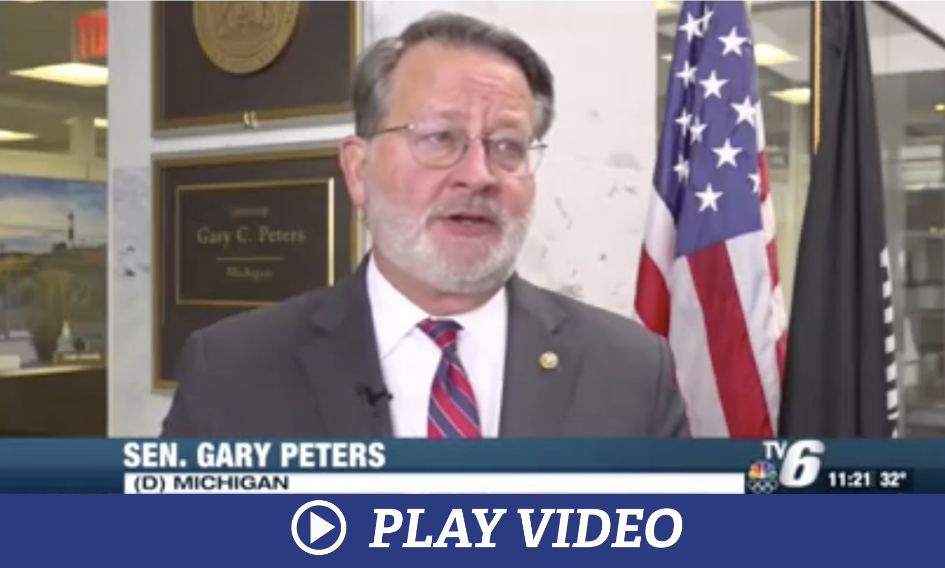VIDEO: Peters Continues to Deliver Results for Michigan in 2021 After Being Rated #1 Most Effective Senator in U.S. Senate and Being Named Chair of the Homeland Security and Governmental Affairs Committee
Peters Releases Series of Videos Highlighting Some of the Many 2021 Accomplishments for Michigan
DETROIT, MI – Throughout 2021, U.S. Senator Gary Peters (MI) continued to deliver results for Michigan. In March, Peters was recognized as the #1 most effective Senator in the 116th Congress by the non-partisan Center for Effective lawmaking. Peters earned this recognition based on his ability to enact and advance bipartisan legislation – despite the fact that he was serving in only his first term and was in the minority party at the time. Peters built off this distinction and continued delivering results for Michigan this year, including as Chairman of the Homeland Security and Governmental Affairs Committee.
Today, Peters released a series of videos highlighting some of the many accomplishments this year. Whether it was:
- Delivering comprehensive COVID-19 relief to Michiganders through the passage of the American Rescue Plan, which included $50 billion Peters secured as Chairman of the Homeland Security and Governmental Affairs Committee to dramatically expand vaccine distribution;
- Fighting for the Great Lakes by ensuring the U.S. Coast Guard Great Lakes Center of Expertise for Oil Spill Preparedness and Response that he authored into law will be headquartered in Michigan;
- Investing in Michigan’s infrastructure by passing the bipartisan Infrastructure Investment and Jobs Act into law – which made the largest investment in the Great Lakes ever and included $500 million in funding for Peters’ STORM Act that was signed into law earlier this year to help communities protect against severe weather events;
- Convening a hearing to hold the Department of Defense accountable for their failure to adequately control toxic Perfluoroalkyl and Polyfluoroalkyl Substances (PFAS) connected to military sites and examine how communities in Michigan and across the country have been harmed; or
- Securing over $144 million for military facilities across Michigan in the annual defense bill through his role on the Senate Armed Services Committee. The funding comes as Peters secured the Department of Defense’s long-term commitment to Michigan – and solidified our state’s growing innovative defense footprint and role as a key part of our national defense.
See below on how Senator Peters has achieved results for Michigan this year:
WATCH: Peters passes American Rescue Plan to deliver COVID-19 relief to Michiganders
Peters helped pass the American Rescue Plan into law to deliver COVID-19 relief to Michiganders. The package included funding to distribute direct stimulus checks, accelerate vaccine distribution, help schools reopen safely, extend unemployment benefits, and support small businesses. As Chairman of the Homeland Security and Governmental Affairs Committee, Peters authored provisions in the bill that dramatically ramped up mass vaccine distribution – like we saw at Ford Field. Also included was the expanded Child Tax Credit – a tax cut that has helped support the immediate needs of Michigan families such as food, clothes and child care. The bill also reauthorized and provided $10 billion in federal funding to the State Small Business Credit Initiative, including $1.5 billion set-aside for minority-owned businesses, which helps small businesses grow and create jobs. Peters previously led the effort to reauthorize the program in the Senate and championed the original language creating the program in the Small Business Jobs Act of 2010 as a member of the House of Representatives.
WATCH: Peters announced the Great Lakes Center of Expertise will be headquartered in Michigan
To further his work to keep the Great Lakes clean, Peters authored and passed legislation into law to create the U.S. Coast Guard Great Lakes Center of Expertise for Oil Spill Preparedness and Response to study the impacts of oil spills in freshwater environments. The inspiration for this bill came in 2017 when the then-Commandant of the U.S. Coast Guard told Peters at a hearing that the agency was not prepared for an oil spill in the Great Lakes, saying that more science and research was needed. In October, Peters announced that the Center of Expertise will be headquartered in Michigan with locations in Sault Ste. Marie and Ann Arbor.
WATCH: Peters helped pass the bipartisan Infrastructure Investment and Jobs Act into law to rebuild Michigan’s infrastructure, support communities dealing with flooding and shoreline erosion and make the largest investment in the Great Lakes ever
Peters helped pass the bipartisan Infrastructure Investment and Jobs Act into law, which invests in Michigan infrastructure, including roads, bridges, high-speed internet, electric vehicles and the Great Lakes. The legislation provides $1 billion for the Great Lakes Restoration Initiative (GLRI), which is the largest investment in the program in history. In 2019, Peters secured the first increase in GLRI funding since the program was established a decade ago.
As Chairman of the Homeland Security and Governmental Affairs Committee, Peters secured a historic $500 million provision to help Michigan communities address the impacts of natural disasters as a part of the new law. The Senator secured the first funding for a loan program he created to help states establish revolving loan funds for local governments to carry out mitigation projects that reduce natural disaster risk. These projects could include upgrades to address extreme flooding, shoreline erosion and rising water levels that have put homes, small businesses, property, and communities at risk, and caused millions of dollars in damages – especially in Michigan. Peters authored the bipartisan Safeguarding Tomorrow through Ongoing Risk Mitigation (STORM) Act, which was signed into law earlier this year, to create this new loan program. Peters highlighted how the program could help communities across Michigan like Oak Park and Grand Rapids.
WATCH: Peters holds Department of Defense accountable for failing to adequately control PFAS contamination at military sites
As Chairman of the Homeland Security and Governmental Affairs Committee, Peters held a hearing about how communities in Michigan and across the country have been harmed by exposure to toxic Perfluoroalkyl and Polyfluoroalkyl Substances (PFAS) connected to military sites. Peters convened the hearing after a Department of Defense (DoD) Inspector General report found that DoD failed to adequately control PFAS contamination at military sites across the nation – resulting in preventable harm to servicemembers, their families, and the surrounding communities. At the hearing, Peters raised the need to hold DoD accountable for their failure to act – and that they must do more to help clean up contaminated sites.
###



